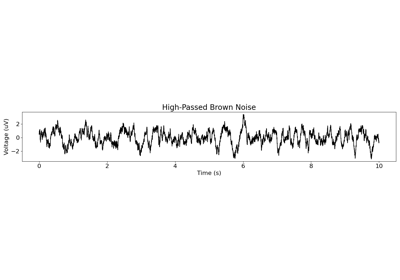neurodsp.sim.sim_synaptic_current¶
- neurodsp.sim.sim_synaptic_current(n_seconds, fs, n_neurons=1000, firing_rate=2.0, tau_r=0.0, tau_d=0.01, t_ker=None)[source]¶
Simulate a signal as a synaptic current, which has 1/f characteristics with a knee.
- Parameters:
- n_secondsfloat
Simulation time, in seconds.
- fsfloat
Sampling rate of simulated signal, in Hz.
- n_neuronsint, optional, default: 1000
Number of neurons in the simulated population.
- firing_ratefloat, optional, default: 2
Firing rate of individual neurons in the population.
- tau_rfloat, optional, default: 0.
Rise time of synaptic kernel, in seconds.
- tau_dfloat, optional, default: 0.01
Decay time of synaptic kernel, in seconds.
- t_kerfloat, optional
Length of time of the simulated synaptic kernel, in seconds.
- Returns:
- sig1d array
Simulated synaptic current.
Notes
This simulation is based on the one used in [1].
The resulting signal is most similar to unsigned intracellular current or conductance change.
References
[1]Gao, R., Peterson, E. J., & Voytek, B. (2017). Inferring synaptic excitation/inhibition balance from field potentials. NeuroImage, 158, 70–78. DOI: https://doi.org/10.1016/j.neuroimage.2017.06.078
Examples
Simulate a synaptic current signal:
>>> sig = sim_synaptic_current(n_seconds=1, fs=500)
